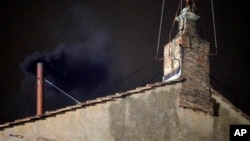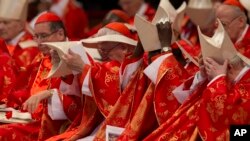Roman Catholic cardinals will meet again at the Vatican Wednesday for their second attempt to elect a successor to Pope Benedict, who resigned last month.
The 115 cardinals participating in the vote met in a secret conclave at the Sistine Chapel Tuesday, but ended their meeting without selecting a new Church leader.
Thousands of people who braved the rain to await results of the conclave saw black smoke billowing from the chimney on the chapel roof. Black smoke signifies that a new pope has not been elected.
When the cardinals agree on a successor to Benedict, white smoke will rise from the chimney and the bells of St. Peter's Basilica will be rung.
The outcome of the first attempt was not unusual because a candidate must receive two-thirds of the vote, or 77 ballots. During the first meeting, several cardinals tend to emerge with more votes than others.
The cardinals will remain sequestered behind the Vatican's medieval walls until they elect a new pontiff.
Papal contenders and electors around the world
The 115 scarlet-robed "princes of the church" filed into the chapel earlier Tuesday, led by prelates holding a crucifix and candles as they chanted the traditional Litany of Saints, imploring for help in choosing the next pope.
Once inside, each cardinal swore an oath of secrecy requiring, under pain of excommunication, that they reveal nothing of their deliberations for the duration of the secret conclave that could last for several days.
Vatican spokesperson Thomas Rosica said the process is a spiritual one.
"Because all of this is about spirituality and prayer. It's rooted in the world, so it's got the earthly part of it. But this is about bringing people to God. And the pope is a pontifex. He is a bridge who brings people to God. And so we're trying to elect somebody who will be a good bridge and a bridge builder," he said.
Molly Silbernagel is an American studying in Rome.
"I'm Catholic and I've been thinking a lot about it," said Silbernagel. "There's a lot of speculation about who it's going to be. They're saying maybe a guy who is interested in science. There is one particular cardinal who used to be a scientist, who does a lot with the sciences. They are thinking maybe he would be a good candidate because he would bridge the gap between the Church and science."
Pope Benedict surprised the world last month when, after eight years, he became the first Roman Catholic Church leader in 600 years to step down voluntarily.
The 115 cardinals participating in the vote met in a secret conclave at the Sistine Chapel Tuesday, but ended their meeting without selecting a new Church leader.
Thousands of people who braved the rain to await results of the conclave saw black smoke billowing from the chimney on the chapel roof. Black smoke signifies that a new pope has not been elected.
When the cardinals agree on a successor to Benedict, white smoke will rise from the chimney and the bells of St. Peter's Basilica will be rung.
The outcome of the first attempt was not unusual because a candidate must receive two-thirds of the vote, or 77 ballots. During the first meeting, several cardinals tend to emerge with more votes than others.
The cardinals will remain sequestered behind the Vatican's medieval walls until they elect a new pontiff.
Papal contenders and electors around the world
The 115 scarlet-robed "princes of the church" filed into the chapel earlier Tuesday, led by prelates holding a crucifix and candles as they chanted the traditional Litany of Saints, imploring for help in choosing the next pope.
Once inside, each cardinal swore an oath of secrecy requiring, under pain of excommunication, that they reveal nothing of their deliberations for the duration of the secret conclave that could last for several days.
Vatican spokesperson Thomas Rosica said the process is a spiritual one.
"Because all of this is about spirituality and prayer. It's rooted in the world, so it's got the earthly part of it. But this is about bringing people to God. And the pope is a pontifex. He is a bridge who brings people to God. And so we're trying to elect somebody who will be a good bridge and a bridge builder," he said.
Molly Silbernagel is an American studying in Rome.
"I'm Catholic and I've been thinking a lot about it," said Silbernagel. "There's a lot of speculation about who it's going to be. They're saying maybe a guy who is interested in science. There is one particular cardinal who used to be a scientist, who does a lot with the sciences. They are thinking maybe he would be a good candidate because he would bridge the gap between the Church and science."
Pope Benedict surprised the world last month when, after eight years, he became the first Roman Catholic Church leader in 600 years to step down voluntarily.






